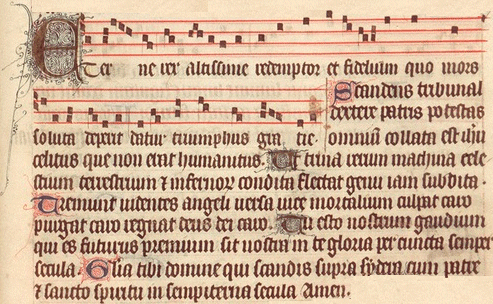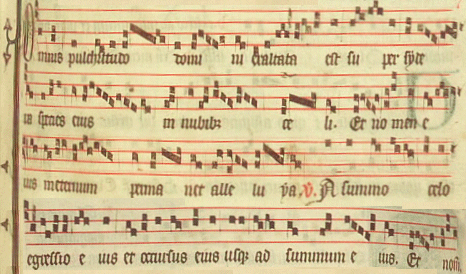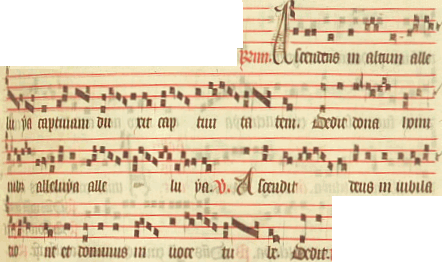Even Years: Leo the Great, Treatise 74, 3-4 (CCL 138 A, 458-459)
| Hanc fidem ascensione domini auctam et sancti spiritus munere roboratam, non uincla, non carceres, non exilia, non fames, non ignis aut laniatus ferarum, nec exquisita persequentium
crudelitatibus supplicia terruerunt. Pro hac fide per uniuersum mundum, non
solum uiri, sed et feminae, nec tantum inpubes pueri, sed etiam tenerae
uirgines, usque ad effusionem sui sanguinis decertarunt. Haec fides daemonia
eiecit, aegritudines depulit, mortuos suscitauit.
| The faith of the infant Church was increased by the Lord's Ascension and strengthened by the gift of the Spirit; it was to remain unshaken by fetters and imprisonment, exile and hunger, fire and ravening beasts, and the most refined tortures ever devised by brutal persecutors. [Throughout the world, not only men, but also women and young boys and girls stood up for this faith by shedding their blood. This faith cast out devels, banished sicknesses, and raised the dead.]
| | Vnde et ipsi beati apostoli, qui
tot miraculis confirmati, tot sermonibus eruditi, atrocitatem tamen dominicae
passionis expauerant, et ueritatem resurrectionis eius non sine haesitatione
susceperant, tantum de ascensione domini profecerunt, ut quidquid illis prius
intulerat metum, uerteretur in gaudium. Totam enim contemplationem animi in
diuinitatem ad patris dexteram consedentis erexerant, nec iam corporeae
uisionis tardabantur obiectu, quominus in id aciem mentis intenderent, quod nec
a patre descendendo afuerat, nec a discipulis ascendendo discesserat.
| Even the blessed Apostles, though they had been strengthened by so many miracles and instructed by so much teaching, took fright at the cruel suffering of the Lord's Passion and could not accept his Resurrection without hesitation. Yet they made such progress through his Ascension that they now found joy in what had terrified them before. They were able to fix their minds on Christ's divinity as he sat at the right hand of the Father, since what was presented to their bodily eyes no longer hindered them from turning all their attention to the realization that he had not left his Father when he came down to earth, nor abandoned his disciples when he ascended into heaven.
| | Tunc igitur, dilectissimi, filius
hominis dei filius excellentius sacratius que innotuit, cum in paternae
maiestatis gloriam se recepit et ineffabili modo coepit esse diuinitate
praesentior, qui factus est humanitate longinquior.
| The truth is that the Son of Man was revealed as Son of God in a more perfect and transcendent way once he had entered into his Father's glory. He now began to be indescribably more present in his divinity to those from whom he was further removed in his humanity.
| | Tunc ad aequalem patri filium
eruditior fides gressu coepit mentis accedere, et contrectatione corporeae in
christo substantiae, qua patre minor est, non egere, quoniam glorificati
corporis manente natura, eo fides credentium uocabatur, ubi non carnali manu, sed
spiritali intellectu, par genitori unigenitus tangeretur.
| A more mature faith enabled their minds to stretch upward to the Son in his equality with the Father; it no longer needed contact with Christ's tangible body, in which as man he is inferior to the Father. For while his glorified body retained the same nature, the faith of those who believed in him was now summoned to heights where, as the Father's equal, the only-begotten Son is reached not by physical handling but by spiritual discernment.
| | Hinc illud est quod post
resurrectionem suam dominus, cum Maria Magdalene personam ecclesiae gerens ad
contactum ipsius properaret accedere, dicit ei: Noli me tangere, nondum enim
ascendi ad patrem meum, hoc est, nolo ut ad me corporaliter uenias, nec ut me
sensu carnis agnoscas, ad sublimiora te differo, maiora tibi praeparo. Cum ad
patrem meum ascendero, tunc me perfectius uerius que palpabis, adprehensura
quod non tangis, et creditura quod non uides. Cum autem ascendentem in caelos
dominum sequaces discipulorum oculi intenta admiratione suspicerent,
adstiterunt coram ipsis angeli duo mirabili uestium candore fulgentes, qui et
dixerunt: Viri Galilaei, quid statis aspicientes in caelum? Hic Iesus qui
adsumptus est a uobis, sic ueniet quemadmodum uidistis eum euntem in caelum.
| This explains why our Lord said to the Church in the person of Mary Magdalene, as she ran forward to cling to him: Do not touch me, for I have not yet ascended to my Father. In other words, I do not want you to come to me corporeally, to recognize me by what your bodily senses tell you; I want you to wait for something higher.
And when the eyes of his disciples, rapt in wonder, followed their ascending Lord to heaven, there stood beside them two angels, in garments of marvellously shining whiteness, who said to them: Men of Galilee, why are you standing looking up to heaven? This Jesus who has been taken from you will come again in the same way as you have seen him going up to heaven.
| | Quibus uerbis omnes ecclesiae filii
docebantur ut Iesus christus in eadem in qua ascenderat carne uenturus
uisibilis crederetur, nec posset ambigi omnia illi esse subiecta, cui ab ipso
corporeae natiuitatis exordio famulatus seruisset angelicus. Sicut enim
concipiendum christum de sancto spiritu beatae uirgini angelus nuntiauit, sic
et editum de uirgine uox caelestium pastoribus cecinit; sicut resurrexisse a
mortuis supernorum nuntiorum testimonia prima docuerunt, sic ad iudicandum
mundum in ipsa carne uenturum angelorum officia praedicarunt, ut intellegeremus
quantae potestates adfuturae sint cum iudicaturo, cui tantae ministrauerunt
etiam iudicando.
| By these words all the Church's children have been taught to believe that Jesus Christ will come again visibly in the same flesh in which he ascended, and that there can be no doubt concerning the subjection of all things to him who was served by angels from the moment of his birth. As it was an angel who announced to the blessed Virgin that Christ would be conceived of the Holy Spirit, so too it was the song of heavenly beings that told the shepherds of his virginal birth; and as the first attestations of his rising from the dead were delivered by messengers from on high, so it was the task of angels to proclaim that he would come in the same flesh to judge the world. All these things were intended to make us realise what tremendous angelic powers are to accompany him when he comes to judge, since such mighty spirits ministered to him even when he came to be judged himself.
|
Odd Years: Augustine of Hippo, Treatise 4 on 1 John, 4-6 (SC 75, 224-232)
| Ecce qualem dilectionem dedit nobis pater ut filii dei uocemur et simus. nam qui uocantur et non sunt quid illis prodest nomen ubi res non est? quam multi uocantur medici qui curare non norunt? quam multi uocantur uigiles qui tota nocte dormiunt? sic multi uocantur
christiani et in rebus non inueniuntur quia hoc quod uocantur non sunt, id est
in uita, in moribus, in fide, in spe, in caritate. hoc autem quid audistis,
fratres? ecce qualem dilectionem dedit nobis pater ut filii dei uocemur et
simus. propter hoc mundus non cognoscit nos, quia non cognouit eum, et nos non
cognoscit mundus. totus mundus christianus est et totus mundus impius. per
totum enim mundum impii et per totum mundum pii; illi illos non cognoscunt propter
hoc mundus non cognouit nos, quia non cognouit eum. ambulabat et ipse dominus
iesus christus in carne. erat deus; latebat in infirmitate. et unde non est
cognitus? quia omnia peccata arguebat in hominibus. illi amando delectationes
peccatorum non agnoscebant deum; amando quod febris suadebat iniuriam medico faciebant.
| See what kind of love the Father has given us, that we should be called and should be the children of God! What use is it to people who are not what they are called to have the name without the reality? There are many so-called doctors who cannot cure, many so-called watchmen who sleep all night. So also there are many so-called Christians who do not prove to be such in reality; their life and conduct do not justify the name they bear, nor do they show themselves to be Christians by their faith, hope, and charity. The whole world is Christian, and the whole world is godless, for there are both godless and devout people everywhere in the world, and the former do not know the latter. The reason why the world does not know us is because it never knew him. The Lord Jesus Christ himself walked on earth; he was God, hidden in the weakness of our flesh. And why was he not recognized? Because he convicted men of every sin they were harbouring. Loving the pleasures of sin, they did not recognize God; loving their own feverish desires, they did violence to their physician.
| | Quid ergo nos? iam nati sumus ex
ipso, sed quia in spe sumus, dilectissimi, inquit, nunc filii dei sumus. iam
nunc? quid est ergo quod expectamus si iam filii dei sumus? et nondum, inquit,
manifestatum est quod erimus. quid autem erit aliud quam filii dei? audite quid
sequitur: scimus quia cum apparuerit, similes ei erimus quoniam uidebimus eum
sicuti est quid nobis promissum est? similes ei erimus quoniam uidebimus eum
sicuti est. quomodo potuit lingua sonuit; cetera corde cogitentur. quid enim
uel ipse iohannes dixit ad comparationem rei quae est uel a nobis dici potest
hominibus longe inparibus meritis ipsius?
| What then of ourselves? We are already born of him, but because we are at present in the domain of hope, St John says to us: Beloved, we are now the children of God. Already? What then are we waiting for, if we are already the children of God? It has not yet been shown us what we shall be in the future, he tells us. Can we become anything more than children of God? Listen to what follows: We know that when he appears we shall be like him, because we shall see him as he is. What is this that we are promised? My friends, the tongue has done all it can; the rest is for the heart to ponder. In comparison with him who is, what could even John say, let alone we who are so far beneath John in merit?
| | Redeamus ergo ad illam unctionem
quae intus docet quod loqui non possumus. et quia modo uidere non potestis,
officium uestrum in desiderio sit. tota uita christiani boni sanctum desiderium
est. quod autem desideras nondum uides, sed desiderando capax efficeris ut cum
uenerit quod uideas, inplearis
| We must return to that anointing which teaches us inwardly what cannot be expressed in words and since you are unable to see as yet, your task must lie in desiring. The entire life of a good Christian is a holy desire. You cannot at present see what you desire, but the desire creates in you a capacity which will be filled when what you desire to see has come.
| | Desideremus ergo, fratres, quia
inplendi sumus. uidete paulum extendentem sinum ut possit capere quod uenturum
est. ait: non quia iam acceperim aut perfectus sim. fratres, ego me non
arbitror adprehendisse. quid ergo agis in hac uita si nondum adprehendisti?
unum autem, quae retro oblitus in ea quae ante sunt extentus secundum
intentionem sequor ad palmam supernae uocationis.
| So then, my brothers, let us desire, because we are meant to be filled. See how Paul stretches forward, so that he will be able to take hold of the prize that is to come. He says: Not that I have already achieved it or am already perfect. I do not reckon I have already attained my goal. What are you doing in this life then, I ask, if you have not yet attained it? One thing only: I forget what is behind me and, stretching forward to what lies ahead, I press on with all my might toward the prize of our heavenly calling.
| | Extentum enim se dixit et
secundum intentionem sequi se dixit. minorem se sentiebat ad capiendum quod
oculus non uidit nec auris audiuit nec in cor hominis ascendit. haec est uita
nostra, ut desiderando exerceamur. tantum autem nos exercet sanctum desiderium quantum
desideria nostra amputauerimus ab amore saeculi extendamus nos in eum ut cum
uenerit, inpleat. similes enim ei erimus quoniam uidebimus eum sicuti est.
| Paul described himself as stretching out and pressing forward with all his might, for he felt himself too small to take in what eye has not seen, nor ear heard, nor the human heart conceived. Such is our life, to exert ourselves in desire; and the more we detach our desire from the love of this world, the more shall we be occupied by holy desires. Let us then stretch ourselves out toward Christ, so that when he comes he may satisfy our desire. We shall then be like him, for we shall see him as he is.
|
| |




